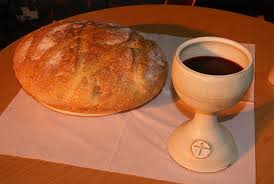 Some time ago I was talking to some Christian friends. The meeting that they had been going to closed, and they started to break bread at another Christian assembly nearby. They enjoyed the fellowship. The people there were committed (I know that because I know a few who go there), the gospel was preached, and in general they were well taught. But what upset them was the fact that the worship service on Lord’s Day mornings was limited to thanking the Father for His giving the Lord, and for His mercies. They did not even address the Lord Himself.
Some time ago I was talking to some Christian friends. The meeting that they had been going to closed, and they started to break bread at another Christian assembly nearby. They enjoyed the fellowship. The people there were committed (I know that because I know a few who go there), the gospel was preached, and in general they were well taught. But what upset them was the fact that the worship service on Lord’s Day mornings was limited to thanking the Father for His giving the Lord, and for His mercies. They did not even address the Lord Himself.
Admittedly they broke bread at the end of the meeting, whereas our friends were accustomed to breaking bread near the beginning, as we do at our meeting. We come together to break bread. We are to examine ourselves and then eat – that should be beforehand. So we should do it straight away (we just have a hymn to the Lord before doing so, to set us together). I know that in Troas Paul discoursed for hours beforehand, but I guess that was an exception. Paul was not a regular visitor!
So when we come together for the breaking of bread who should we thank? Who died for us? Who shed His blood? Whom are we remembering? – Jesus. Then I think it is best to address Him personally. He loves to hear us. Is it wrong to address the Father? A couple of years ago an elderly, and somewhat senile brother – but absolutely clear in the Lord’s things gave thanks to the Lord before the loaf and to the Father before the cup. That is what they did when he was young. We had a good meting. But I would not do that.
Then after the supper what? Is it not a time to express our love for God – Father, Son and Holy Spirit?
We can speak to the Lord about what He is, and what He has done – a completed work. He did it in view of the joy lying before Him (See Heb 2:12). We can enter into His joy. The first thing the Lord said after the resurrection was ‘Go tell my brethren’ (John 20:17). We can enjoy that relationship. Then He delights in His assembly. The marriage of the Lamb is future, but she is His wife now. And she can commune with Him.
His glory is in the praise of His Father. ‘The true worshippers shall worship the Father in spirit and in truth: for the Father seeketh such to worship him. God is a Spirit: and they that worship him must worship him in spirit and in truth.’ (John 4:23). Clearly the Father is the object of worship in the Service of praise, and that involves the Holy Spirit.
This brings me to the question of worship to the Spirit. Some have difficulty about it, as there is no direct reference to worshipping the Spirit. Scriptures like ‘Spring up, O well; sing ye unto it’ (Num 21:17) help. Also in Philippians ‘For we are the circumcision, which worship God in the spirit’ (ch. 3:3). Darby says ‘To worship “in spirit” is to worship according to the true nature of God, and in the power of that communion which the Spirit of God gives.’(Collected Writings vol 7- Doctrinal 2 p100 ‘On Worship’). James Taylor Sr. said, ‘If we worship God we worship the Spirit. He has part in the Godhead, and thus it is very simple and very practical, but very true, that the blessed Spirit, as having part in the Godhead, is worshipped’(Ministry – Vol. 67 page 515). It has been said that if you have a best Friend here, surely you can say ‘thank you’ to Him.
Worship should be spontaneous, springing up by the Holy Spirit. Unfortunately we all know so many good phrases and it is easy to string them together forming a well turned out part. Which gives God the most pleasure – the erudite composition, or the simple ‘Thank You Lord’ from a sincere heart?
There has been much good ministry, leading to an orderly progression in the service. But the order is not the thing. There is no liturgy; there are no rules. After all, who is the Minister of the sanctuary? (See Heb 8:2)
PS I have refrained from using the expression’Holy communion’. It is that, but the expression is often associated with book-read formality.
Sosthenes
October 2015


